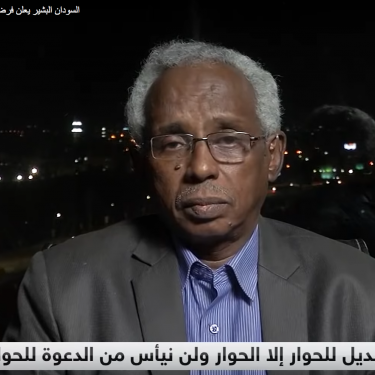Sudan : Media still under pressure despite newspaper editor’s release

Reporters Without Borders (RSF) welcomes the release of a leading Sudanese newspaper editor who has been held for more than a month but remains very concerned by the continuing crackdown on Sudan’s media for daring to covering major anti-government protests.
Update :
RSF hails Al-Tayar editor Osman Mirghani’s release after five weeks in detention but continues to be concerned about the significant decline in press freedom in connection with the protests against President Omar al-Bashir’s government that began on 19 December. The National Intelligence and Security Service (NISS) arrested Mirghani on 22 February, a few hours after he spoke critically on a foreign TV channel about the state of emergency that the president had declared earlier that day.
A few hours before Mirghani’s release, RSF had announced its intention to write to the UN asking it to intercede. RSF reiterates its request to the Sudanese authorities to end the arrests of journalists and the arbitrary seizures of newspaper issues, the frequency of which has reached an unprecedented level. Journalists have a greater need than ever to be able to work without fear of reprisals, in order to cover the dramatic events taking place in Sudan.
The editor of the independent daily Al-Tayar, Osman Mirghani is clearly paying for his criticism of the 12-month state emergency that President Omar al-Bashir declared on 22 February. Interviewed the same day by Sky News Arabia, a TV news channel based in Abu Dhabi, Mirghani said that, far from ending the now three-month-old wave of protests, the state of emergency would just “trigger a new wave of demonstrations.”
Arrested at his office by the National Intelligence and Security Service (NISS) a few hours later, Mirghani has not been formally charged and has not yet been allowed access to a lawyer. His family told RSF that they have been allowed to see him only once.
From the outset, his newspaper has criticized the regime’s crackdown on the demonstrations calling for the resignation of Bashir, who has ruled Sudan for nearly 30 years. As a result, it has repeatedly been targeted by the NISS, which has confiscated its issues on 15 occasions since the start of the protests.
“We'll write today to the United Nations asking it to intercede so that this leading Sudanese newspaper editor and columnist can be released,” said Arnaud Froger, the head of RSF’s Africa desk.“This journalist’s incommunicado detention for more than a month is yet further evidence, if any were needed, of the reprisals to which all critics of the Sudanese regime are exposed. It also exemplifies the unprecedented degree to which the media have been gagged. We have never seen so many seizures of newspaper issues and arrests of journalists in such a short period in Sudan.”
Since the start of the protests on 19 December, RSF has registered 90 arbitrary arrests of journalists and nearly 100 confiscations of newspaper issues. This highly repressive policy is facilitated by the 2010 national security law that allows the NISS to detain someone preventively for three months without letting them see a lawyer.
Several dozen journalists staged a street demonstration in Khartoum on 25 March in protest against the regime’s crackdown on the media and to demand Mirghani’s release. No other journalist has been held for so long since the start of the anti-government protests. In 2014, Mirghani, was attacked and beaten unconscious after referring to the relations between Sudan and Israel during a radio debate. His assailants were never brought to justice.
Sudan is ranked 174th out of 180 countries in RSF’s 2018 World Press Freedom Index.



